The Electronic Intifada 3 December 2021

Palestinians mourn over the body of Isra Khazimiya during her funeral in Qabatiya village near the northern West Bank City of Jenin on 20 November. The woman was killed by Israeli forces in Jerusalem’s Old City on 30 September after she was stopped and allegedly pulled out a knife. Israel held her body for nearly three months.
APA imagesIsraeli occupation forces killed four Palestinians – two of them children – during November.
Israeli forces and settlers have killed more than 330 Palestinians in the West Bank and Gaza since the beginning of the year.
Soldiers shot Muhammad Amjad Dadas, 15, in the stomach during confrontations near Nablus in the northern occupied West Bank on 5 November, killing him.
Palestinians have held frequent protests near Elon Moreh settlement that was established on land belonging to Deir al-Hatab village, according to Defense for Children International-Palestine.
Witnesses said that a soldier opened fire and fatally injured the boy after he was hit by a stone thrown by protesters.
Muhammad Dadas was an avid photographer and aspired to work as a photojournalist, his father told media.
Tor Wennesland, the UN Middle East peace envoy, told the Security Council that the child’s killing was being investigated by the Israeli military.
B’Tselem, a leading human rights group in Israel, has dismissed Israel’s self-investigation mechanism as a “fig leaf for the occupation.”
“Wilful killings”
After the killing of Dadas, Ayed Abu Eqtaish, a program director with Defense for Children International-Palestine, said that “systemic impunity has fostered an environment where Israeli forces know no bounds.”
The rights group added that “Israeli forces use lethal force against Palestinian children in circumstances that may amount to extrajudicial or wilful killings.”
Israeli forces shot and killed Saddam Hussein Bani Odeh, 26, in Tubas, a city in the northern West Bank, during an arrest raid on 16 November.
Footage of the raid appears to show Palestinians firing on the invading Israeli forces. No Israelis were injured.
The Palestinian resistance group Islamic Jihad claimed Bani Odeh as a member.
The following day, an Israeli civilian shot and killed Omar Ibrahim Ayoub Abu Assab, 16, after the teen allegedly stabbed two paramilitary Border Police officers in Jerusalem’s Old City.
The armed civilian, identified by media as the head of a seminary founded by Ateret Kohanim, a pro-settlement organization, fired at least six shots at the boy, eyewitnesses told Defense for Children International-Palestine.
The Israeli Border Police officers sustained light to moderate wounds.
Defense for Children International-Palestine said that Omar Abu Assab was the 16th Palestinian child shot and killed by Israeli forces or civilians in the occupied West Bank, including East Jerusalem, so far this year.
Bodies withheld
Israeli forces have detained Omar’s body as part of its policy of withholding the corpses of Palestinians slain in the course of alleged attacks.
In 2019, the Israeli high court put its stamp of approval on the policy, which aims to use Palestinian bodies as bargaining chips to secure the remains of Israeli soldiers held by Palestinians.
The Israeli practice is “a violation of international humanitarian law and international human rights law, which include absolute prohibitions on cruel, inhuman or degrading treatment,” according to Defense for Children International-Palestine.
Also in Jerusalem’s Old City, Israeli forces shot and killed Fadi Abu Shkheidem, 42, after he opened fire at Israelis near the Chain Gate to the al-Aqsa mosque compound on 21 November.
Eliyahu David Kay, 26, was killed. Three others, including two police officers, were injured.
Hamas claimed that Abu Shkheidem, a school teacher, was affiliated with the party.
After the shooting, occupation forces raided Abu Shkheidem’s home in Shuafat refugee camp, which is cordoned off by Israel’s wall. Israeli forces arrested several of Abu Shkheidem’s relatives, including his wife and daughter.
Kay, the man slain by Abu Shkheidem, was a recent immigrant from South Africa who worked as a tour guide at the Western Wall and was on his way to work when he was shot, according to Israeli media.
His death brings to 15 the number of Israelis or people in Israel killed in the context of the occupation so far this year.
The Israeli army razed the 700-year-old Moroccan Quarter of Jerusalem’s Old City to create the Western Wall plaza immediately after capturing Jerusalem during the 1967 War.
Medical neglect
Also during November, Sami al-Amour, 39, died while in Israeli detention. Al-Amour received inadequate medical care for a congenital heart problem and other health issues during his 13 years of imprisonment.
Israel has withheld al-Amour’s body, preventing his family from holding a burial.
Israel is now refusing to hand over the bodies of eight Palestinian prisoners to their families. The eight include al-Amour’s body and those of two other prisoners from Gaza.
Before he died, al-Amour was among 230 people from Gaza held behind Israel’s bars. In total, 4,650 Palestinians are now being detained by Israel.
On 29 November, Philippe Lazzarini, the head of UNRWA, the UN agency for Palestine refugees, said that a funding shortfall meant that it was unable to pay its 28,000 employees, most of whom are Palestinians, on time.
UNRWA provides essential services to Palestinian refugees in the West Bank, Gaza Strip, Syria, Lebanon and Jordan.
“If UNRWA health services are compromised in the middle of a global pandemic, COVID-19 vaccination rollout will come to an end,” Lazzarini warned.
“Maternal and child care will stop, half a million girls and boys not knowing if they can continue learning, and over two million of the poorest Palestinian refugees will not get cash and food assistance,” he added.
“The humanitarian needs of Palestinian refugees keep increasing while funding to the agency has stagnated since 2013.”
Separately, Wennesland, the UN secretary general’s Middle East envoy, warned of “an untenable fiscal crisis within the Palestinian Authority” during his briefing to the Security Council on 30 November.
Wennesland also reported that a Palestinian man was critically injured and his 10-year-old son wounded when their car overturned after being attacked by Israeli settlers on 24 November.
He added that “some 3,000 olive trees have been damaged or have had their harvest stolen” since the Palestinian harvest began in early October.
Israeli settlers have attacked “Palestinian farmers, volunteers and humanitarian volunteers,” sometimes in the presence of Israeli soldiers, Wennesland added.
Also during November, Israel extended its designation of six Palestinian nongovernmental organizations as “terrorist organizations” to the West Bank through a military order.
The military order puts the organizations’ “staff members and their property at imminent risk of raid, arrest and reprisals,” according to Al-Haq, one of the targeted groups.
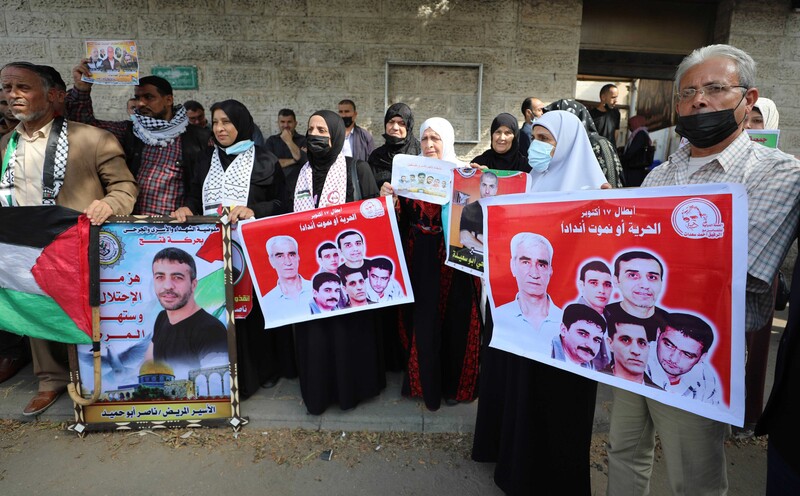
Palestinians protest in front of the Gaza City offices of the International Committee of the Red Cross in solidarity with prisoners on hunger strike in Israeli jails on 1 November.
APA images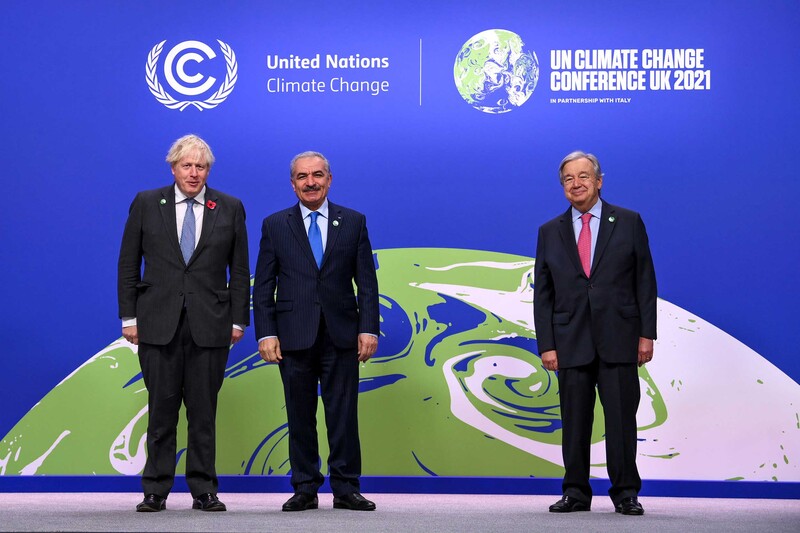
Palestinian Authority Prime Minister Mohammed Ishtayeh poses with UK Prime Minister Boris Johnson and UN Secretary-General Antonio Guterres at an event on the sidelines of the COP26 UN Climate Change Conference in Glasgow, Scotland, on 1 November.
Prime Minister’s office
Palestinian Authority leader Mahmoud Abbas meets with Pope Francis in Rome on 4 November.
APA images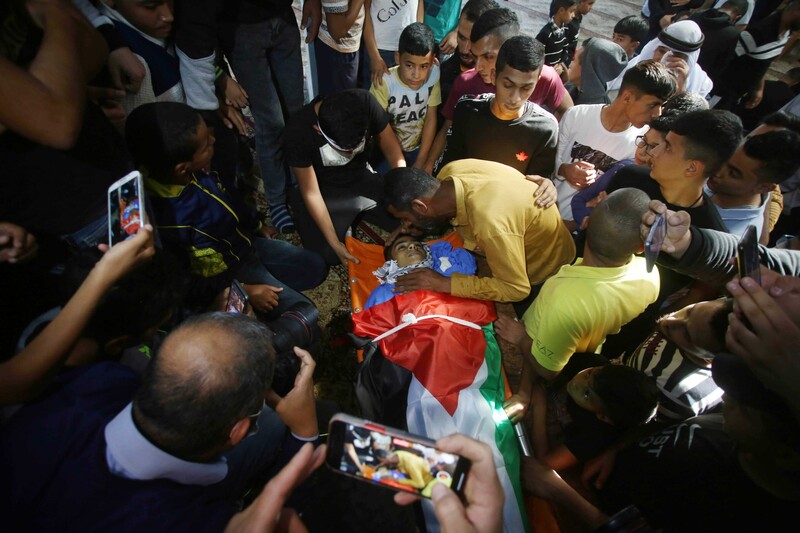
Mourners carry the body of Muhammad Dadas, 15, who was killed by Israeli forces near the West Bank city of Nablus the previous day, during his funeral on 6 November.
APA images
A Palestinian man inspects his vandalized vehicle near a wall painted with graffiti reading in Hebrew “there will be a war over Judea and Samaria” after suspected Israeli settlers attacked Palestinian property overnight in the West Bank city of Ramallah, 9 November.
WAFA
Palestinian musician Khader al-Bayed gives lessons to youth at his Gaza City home on 10 November.
APA images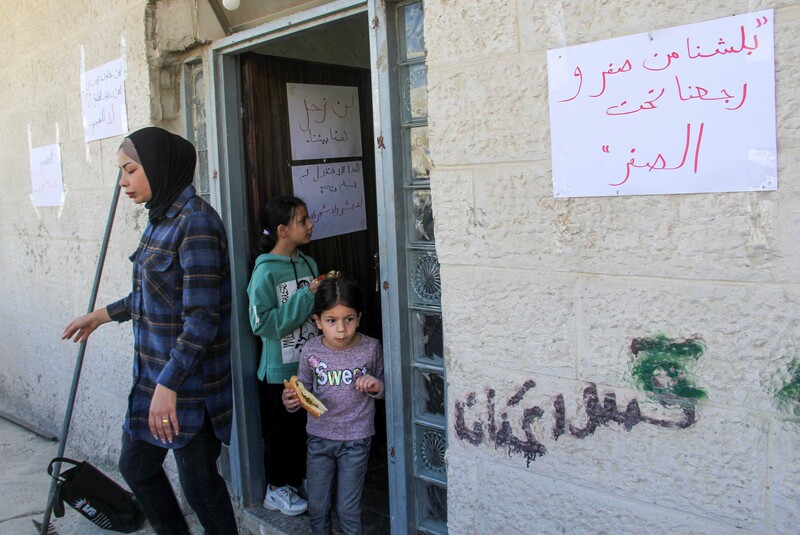
Palestinian residents gather outside of their building that is under an Israeli demolition order on the pretext that it was constructed without a permit in the East Jerusalem neighborhood of al-Tur on 12 November. Some 70 Palestinian residents, half of whom are children, were given an ultimatum to pay a fine of approximately $63,000 and self-demolish the building by the end of the month, or refuse and be charged 10 times the figure when Israel demolishes the building.
APA images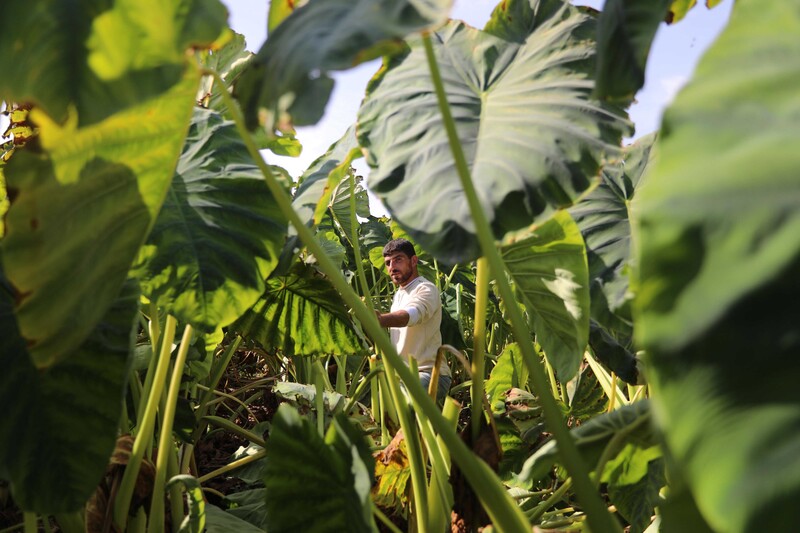
A Palestinian farmer harvests taro in Gaza City on 13 November. The root vegetable, similar to the yam, is a food staple in African, Oceanic and South Asian cultures and is believed to be one of the earliest cultivated plants.
APA images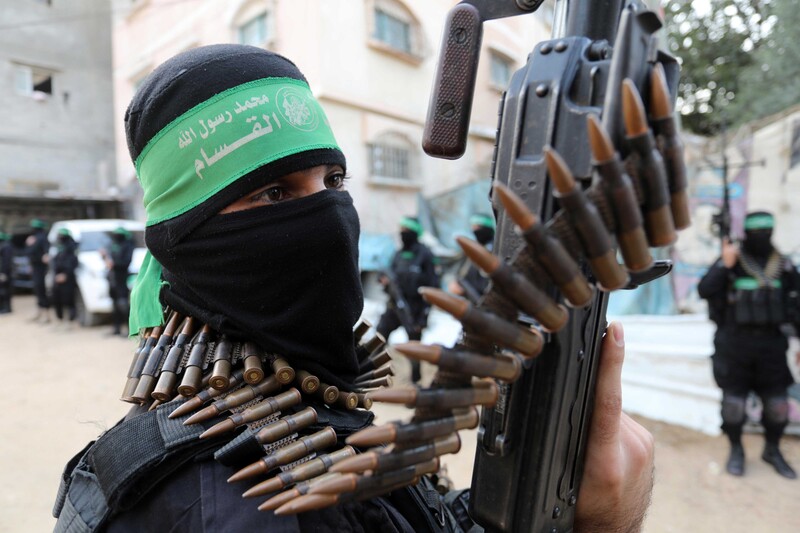
Members of the Qassam Brigades, the military wing of Hamas, take part in a parade in Gaza City on 14 November.
APA images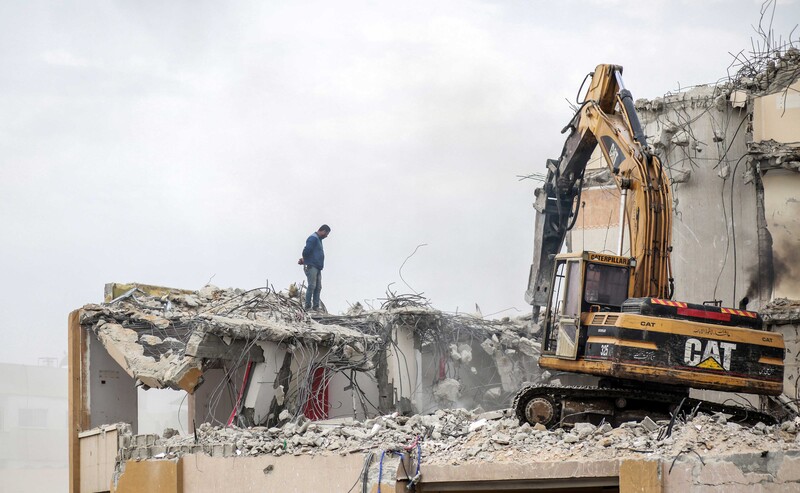
Palestinian workers remove debris from Gaza City’s al-Jawhara tower, which was destroyed in Israeli strikes during May, on 14 November.
APA images
Palestinians protest in front of UNRWA headquarters in Gaza City on 16 November. Several donor countries were scheduled to convene in Brussels to discuss resuming financial support to the chronically underfunded UN agency and the Palestinian Authority.
APA images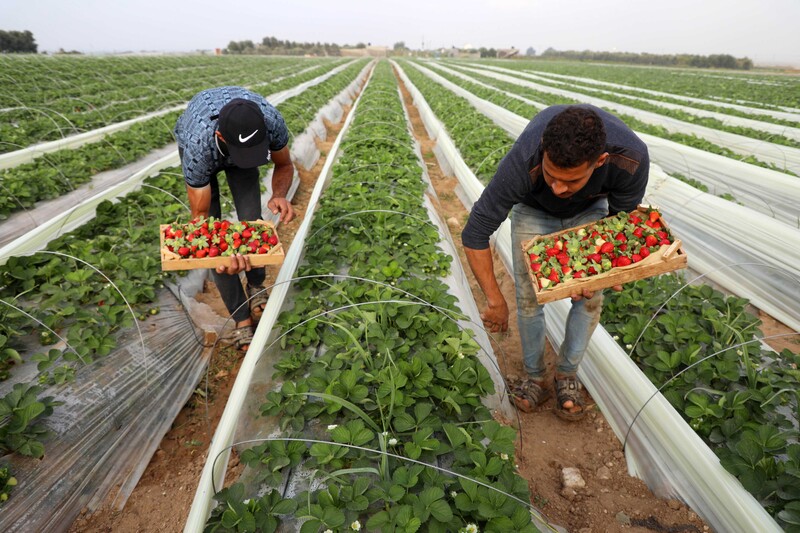
Palestinian farmers in Beit Lahiya, northern Gaza, harvest strawberries for export to the West Bank on 17 November.
APA images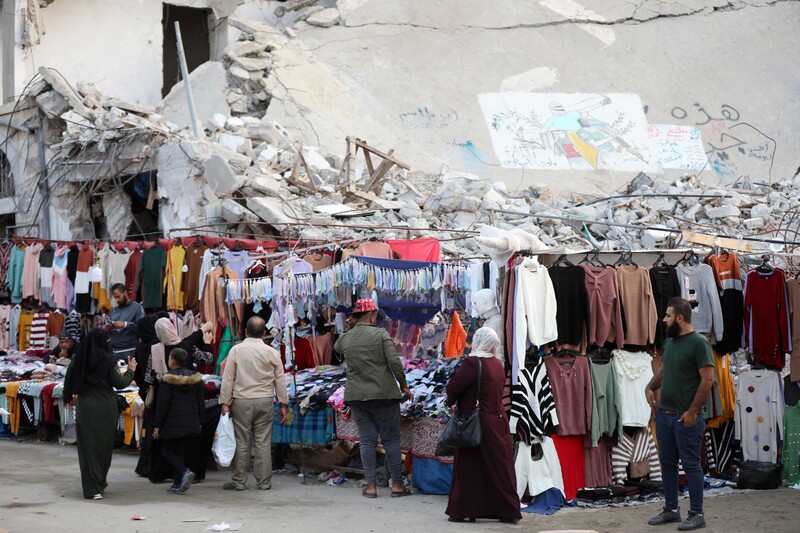
Palestinians shop in a street market near the rubble of al-Shurouq tower in Gaza City’s al-Rimal neighborhood which was targeted by Israeli airstrikes during May, 17 November. Al-Shurouq tower was one of nine destroyed by Israel during the 11-day escalation.
APA images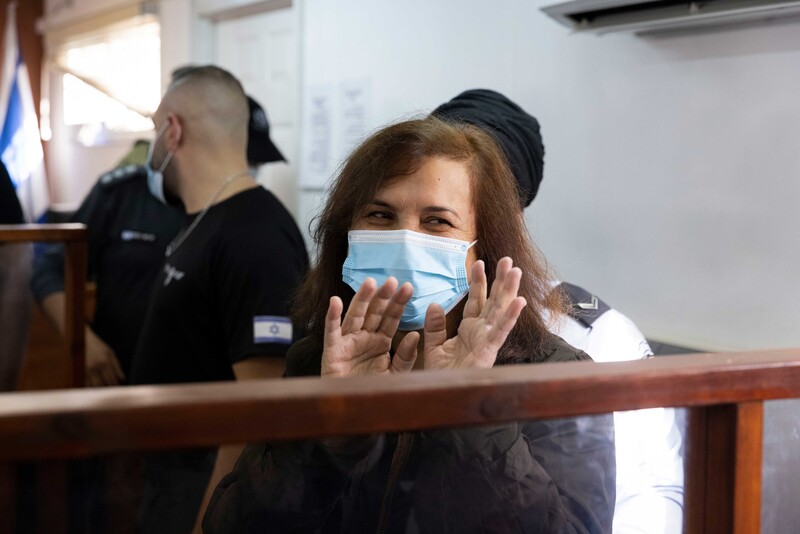
Juana Ruiz Rishmawi, a Spanish citizen, is seen at Ofer military court before her verdict hearing on 17 November. The Israeli court sentenced her to 13 months in prison for her work with the Palestinian Health Work Committees. Ruiz has already spent seven months in prison since her arrest in April. Israel’s foreign and defense ministries celebrated the conviction, tying Ruiz to the case it has manufactured to outlaw six prominent Palestinian human rights and social services organizations. The military court that convicted Ruiz clarified that she was not accused and has no knowledge about those cases.
ActiveStills
Women call for housing rights at a protest tent camp in Jaffa, near Tel Aviv, set up by Palestinian women, 17 November.
ActiveStills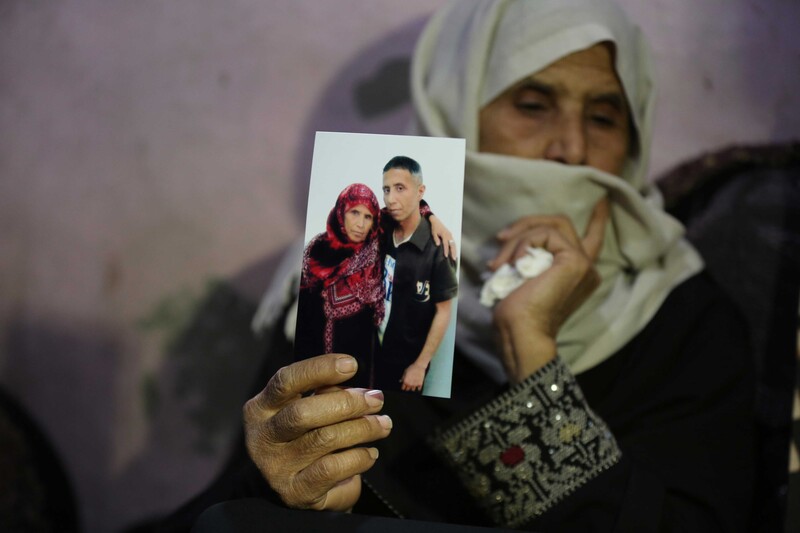
The mother of Sami al-Amour, who died in Israeli detention after being subjected to medical neglect, at her home in Deir al-Balah, central Gaza Strip, on 18 November.
APA images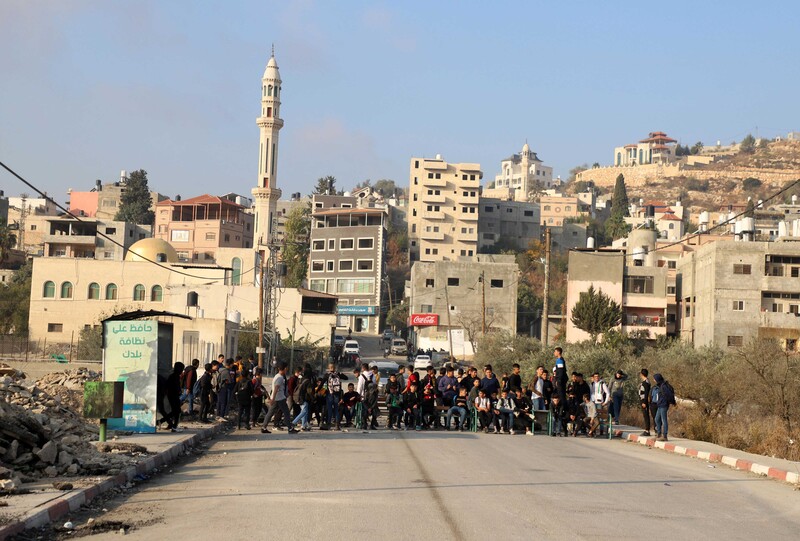
Palestinians block a road after Israeli occupation forces and settlers prevented Palestinian students from reaching their school in al-Lubban al-Sharqiya village, south of Nablus, in the northern West Bank on 18 November. For the third consecutive day, Israeli forces assaulted Palestinian students on their way to school in the village.
APA images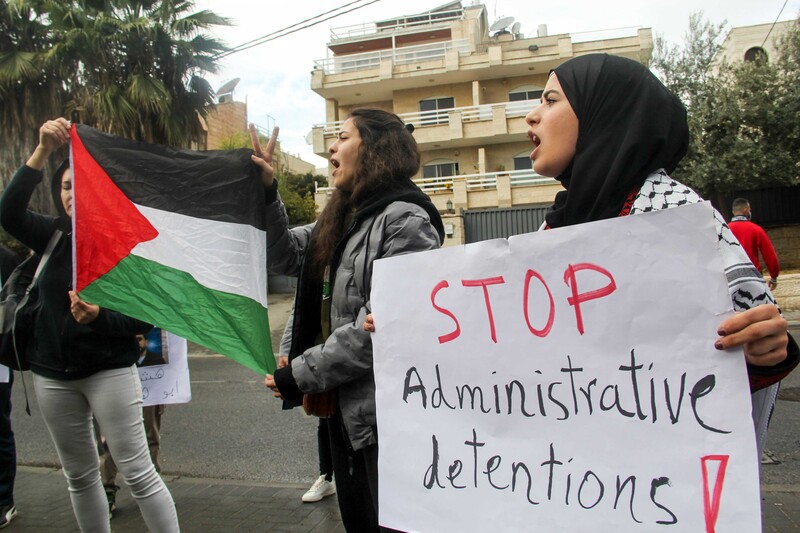
Palestinians in the Sheikh Jarrah neighborhood of East Jerusalem call for the release of Palestinian prisoners held without charge or trial by Israel under administrative detention orders on 21 November.
APA images
Palestinian farmers harvest oranges in Beit Lahiya, northern Gaza Strip, on 20 November.
APA images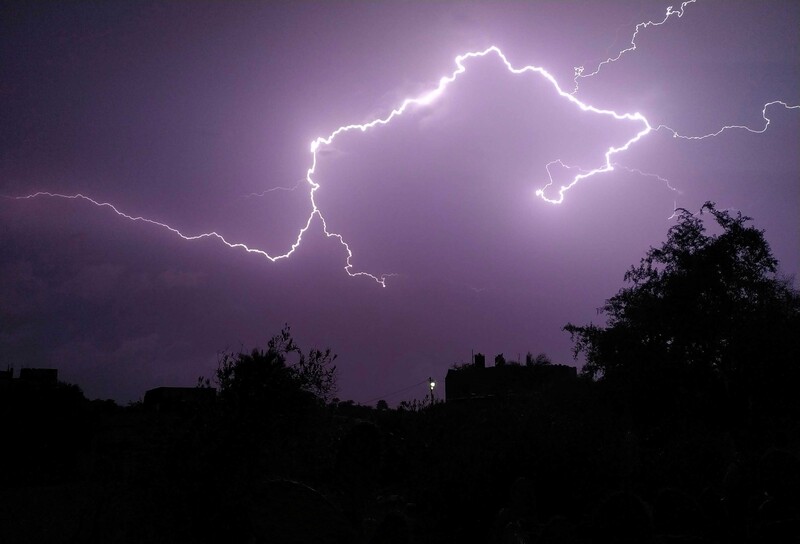
Lightning flashes across the Gaza City sky during a rainstorm on 20 November.
APA images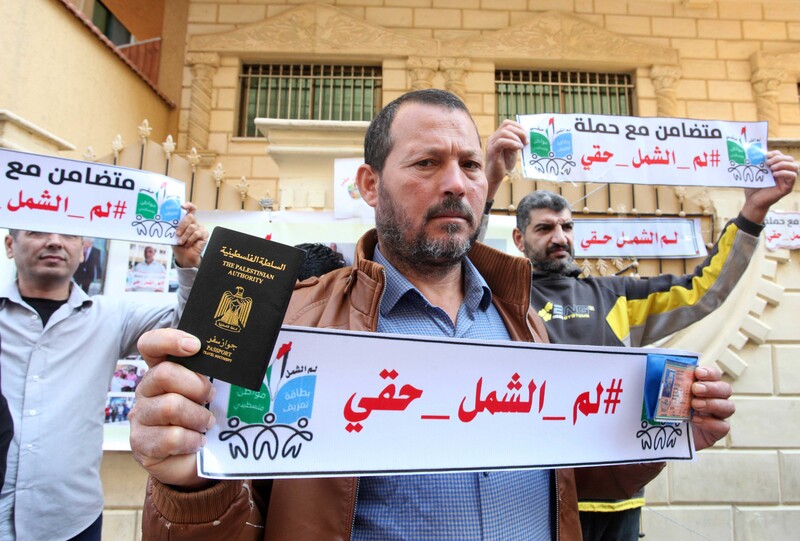
Palestinians rally in front of UNSCO headquarters in Gaza City to demand family reunification on 22 November. Israel denies family reunification to Palestinians as part of its efforts to demographically engineer Palestinian society to facilitate its apartheid and colonial rule.
APA images
A Palestinian man works at a kuffiyeh textile factory in the West Bank City of Hebron on 22 November.
APA images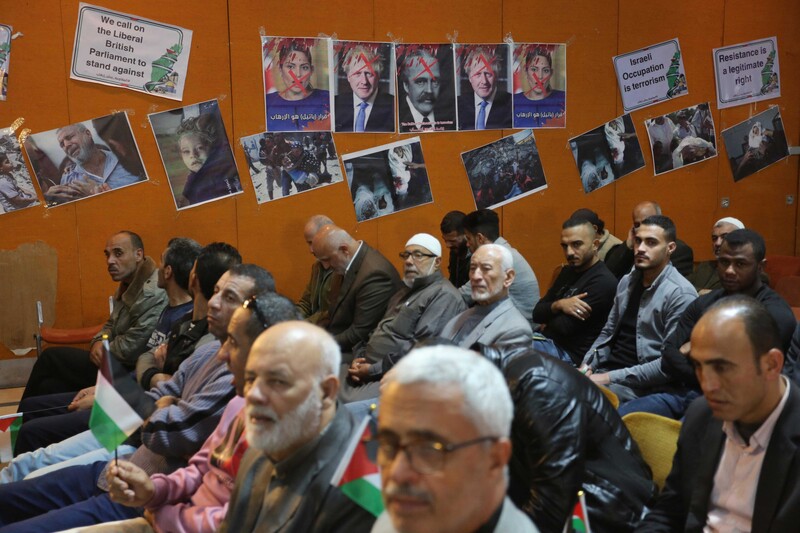
Palestinians in Gaza City rally against British Home Secretary Priti Patel’s decision to proscribe all of Hamas as a terrorist organization, 23 November. Showing support for Hamas in Britain could be punished by up to 14 years in prison if the UK government succeeds in banning the group.
APA images
Masoud al-Qatati sells sweets at low prices and sometimes for free at his Gaza City shop due to the difficult economic conditions for Palestinians living in the Gaza Strip, 23 November.
APA images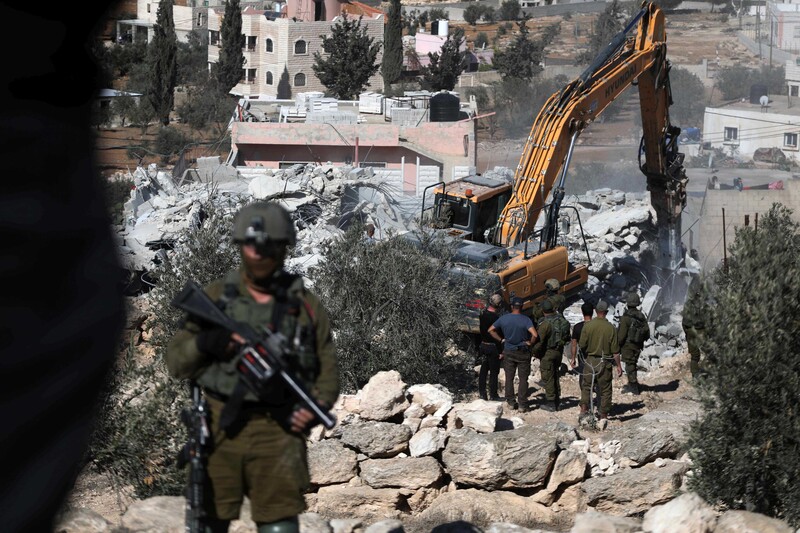
An Israeli bulldozer demolishes a Palestinian home under the pretext that it was built without a permit in Yatta, south of the West Bank city of Hebron, on 23 November. Israel rarely grants building permits to Palestinians in so-called Area C — some 60 percent of the West Bank under full Israeli military control.
APA images
Palestinian Authority Prime Minister Mohammed Ishtayeh attends the opening of Hisham Palace in the West Bank city of Jericho on 23 November. The archaeological site dating from the Umayyad period was reopened after a five-year restoration project on its mosaic floor.
Prime Minister’s office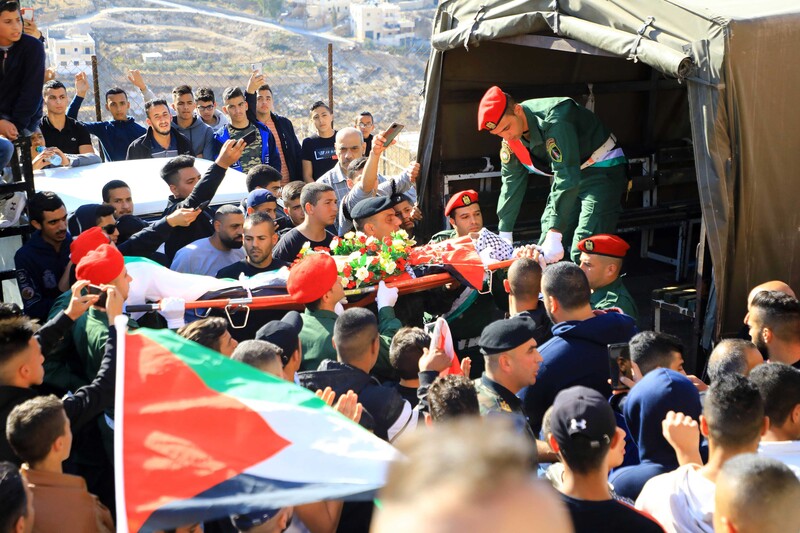
Palestinians in the West Bank city of Bethlehem attend the funeral of Amjad Abu Sultan, 14, who was killed by Israeli forces the previous month, 26 November. The teen was shot by soldiers waiting in an ambush after allegedly lighting a Molotov cocktail. Israeli authorities held Abu Sultan’s body for nearly a month before transferring it to his family for burial.
APA images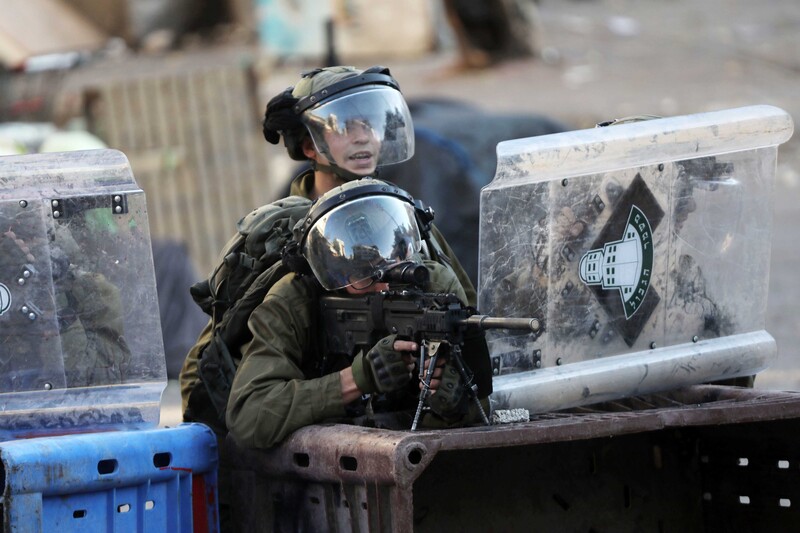
Israeli occupation forces take aim at Palestinian protesters in the West Bank city of Hebron on 26 November.
APA images
Palestinians confront Israeli occupation forces during a protest against settlements in the northern West Bank village of Beita, 26 November.
APA images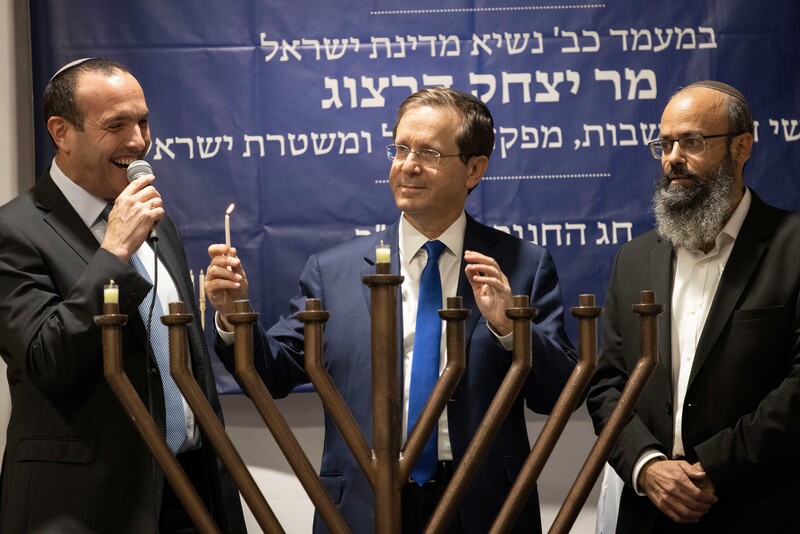
Israeli president Isaac Herzog takes part in a Hanukkah celebration inside the Ibrahimi mosque, also known as the Tomb of the Patriarchs in the West Bank city of Hebron on 28 November. Believed to be the final resting place of the prophet Abraham, a holy figure for Jews and Muslims, the mosque was also the site of a massacre by a Brooklyn-born settler who gunned down 29 worshippers in 1994. Following the massacre, Israel strengthened its grip over the city, partitioning the mosque and allowing more settlers to take over Palestinian properties.
ActiveStills
A Palestinian laboratory medicine specialist carries out COVID-19 tests in Gaza City on 28 November.
APA images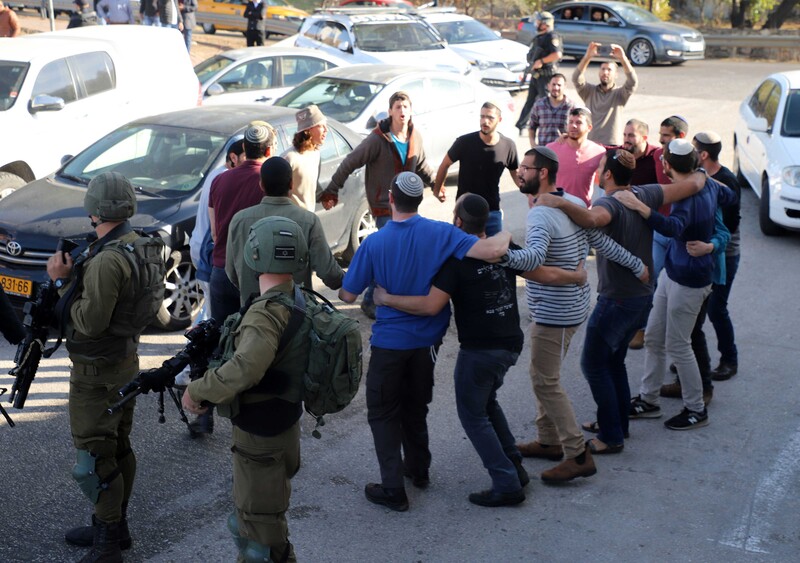
Israeli settlers dance as occupation forces stand guard while blocking the entrance to the Palestinian village of al-Lubban al-Sharqiya, south of the West Bank city of Nablus, on 28 November. Dozens of rampaging Israeli settlers attacked the village and prevented Palestinian children from going to school.
APA images
Israeli occupation forces destroy a well in the village of Nilin, near the West Bank city Ramallah, on 29 November.
WAFA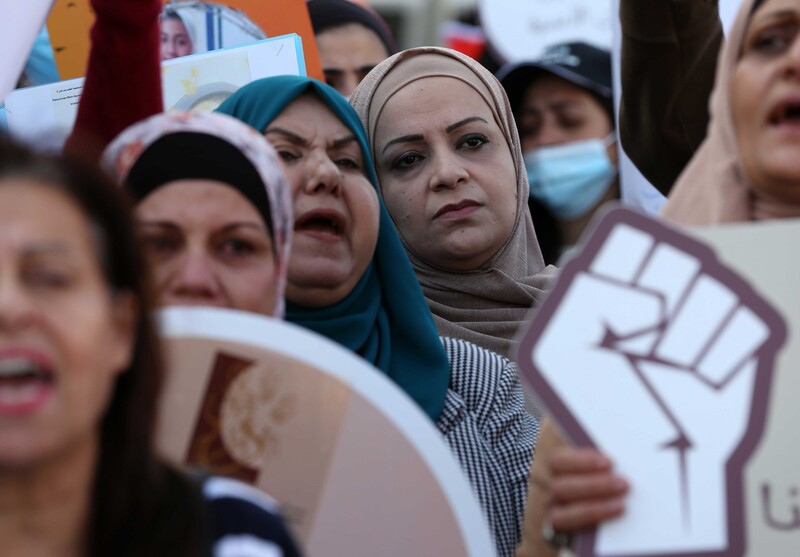
Palestinian women call for protection against domestic violence and the adoption of a family protection law during the weekly meeting of the Palestinian government in the West Bank city of Nablus on 29 November.
APA images
A Palestinian worker sorts through electronic waste such as batteries, a popular product in the midst of Gaza’s electricity crisis, after Israeli authorities prevented the export of 25,000 tons of damaged batteries in Jabaliya, northern Gaza Strip, 29 November.
APA images
A Palestinian woman drives her donkey-drawn cart along the coastal road in Gaza City on 30 November.
APA images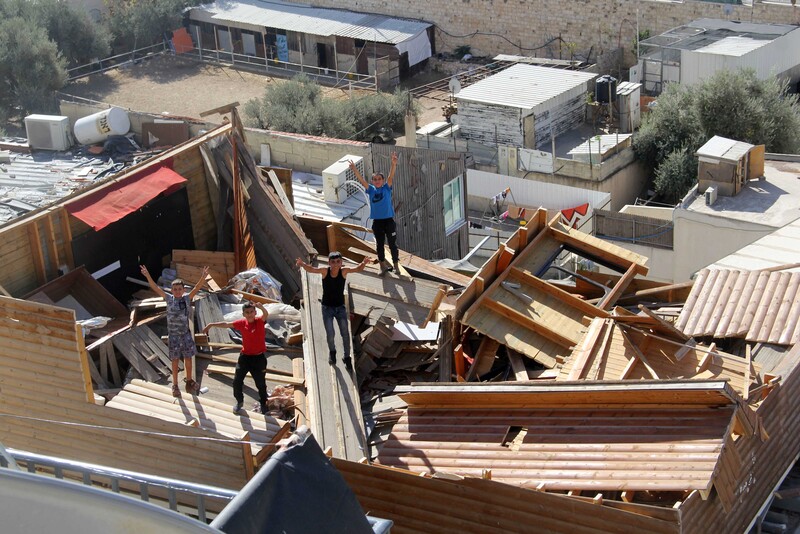
Palestinian children stand on the ruins of a home demolished by Israeli occupation forces on the pretext that it was built without a permit in the East Jerusalem neighborhood of Silwan on 30 November.
APA images

